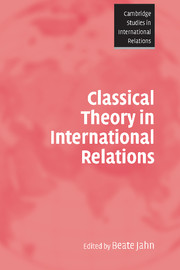Book contents
- Frontmatter
- Contents
- Notes on contributors
- Acknowledgements
- 1 Classical theory and international relations in context
- Part I Intellectual contexts
- Part II Political contexts
- 6 The Savage Smith and the temporal walls of capitalism
- 7 Property and propriety in international relations: the case of John Locke
- 8 Classical smoke, classical mirror: Kant and Mill in liberal international relations theory
- Part III Lineages
- Index
- CAMBRIDGE STUDIES IN INTERNATIONAL RELATIONS
7 - Property and propriety in international relations: the case of John Locke
Published online by Cambridge University Press: 22 September 2009
- Frontmatter
- Contents
- Notes on contributors
- Acknowledgements
- 1 Classical theory and international relations in context
- Part I Intellectual contexts
- Part II Political contexts
- 6 The Savage Smith and the temporal walls of capitalism
- 7 Property and propriety in international relations: the case of John Locke
- 8 Classical smoke, classical mirror: Kant and Mill in liberal international relations theory
- Part III Lineages
- Index
- CAMBRIDGE STUDIES IN INTERNATIONAL RELATIONS
Summary
Introduction
It is a common assumption, although not undisputed, that Locke's Two Treatises of Government considerably influenced the framers of both the ‘Virginian Declaration of Rights’ (1776), and shortly afterwards, in the same year, ‘The Declaration of Independence’. The second declaration informs us that our Creator has bestowed upon us certain ‘unalienable Rights’, among which are Life, Liberty and the pursuit of Happiness. In the former declaration all men are acknowledged to have inherent rights, including ‘the means of acquiring and possessing property’. It is this right of acquiring and of possessing property, acknowledged in ‘The Declaration of Independence’, that had in fact been central to discussions about the relations of Europeans to non-Europeans in International Relations. And it is the importance of property in such discussions that I want to explore in this chapter, with specific reference to John Locke, but also with a wider frame of reference to the classic thinkers in International Relations. I use the case of Locke in order to illustrate the importance of theories of property in discussions of International Relations. It is, I think, another instance of extending domestic considerations and conceptions to the international sphere. It is not surprising that property rights have such a significant place. Property was central in late medieval and early modern European history in defining the political person. Property was the qualification for entry into the public arena. It brought with it political rights that non-property holders, and those with little property, did not have.
- Type
- Chapter
- Information
- Classical Theory in International Relations , pp. 156 - 177Publisher: Cambridge University PressPrint publication year: 2006
- 9
- Cited by



